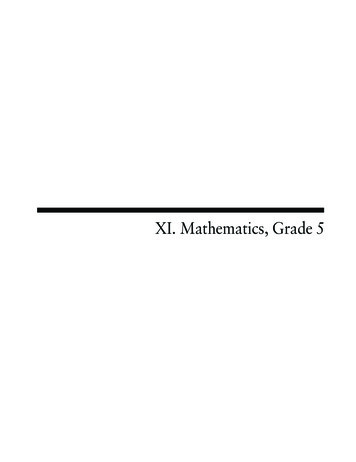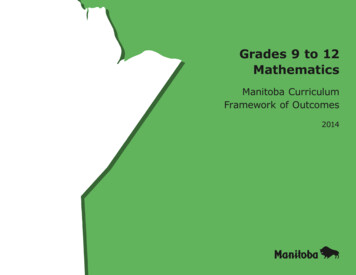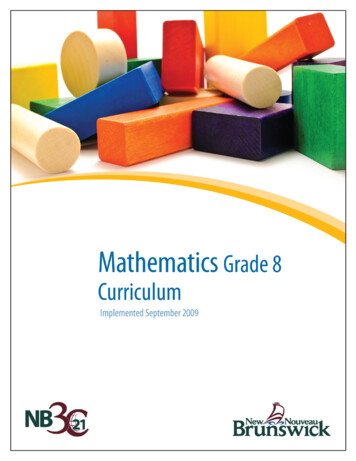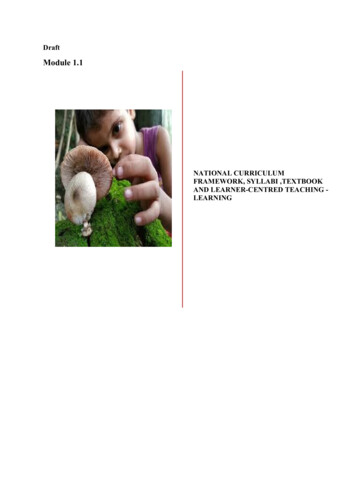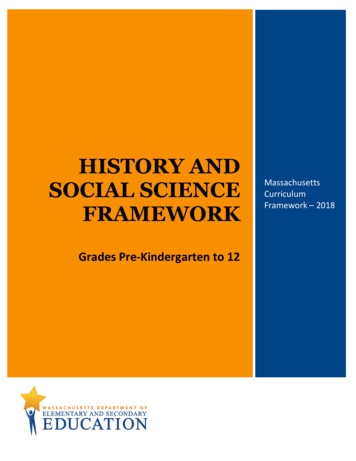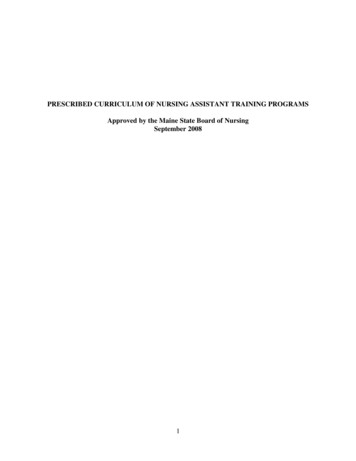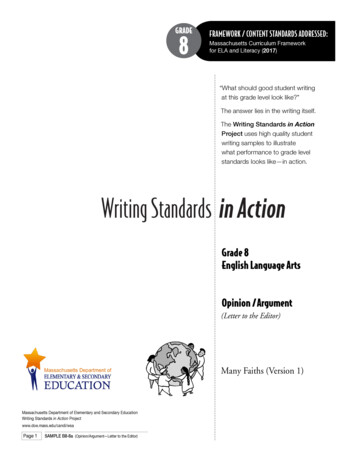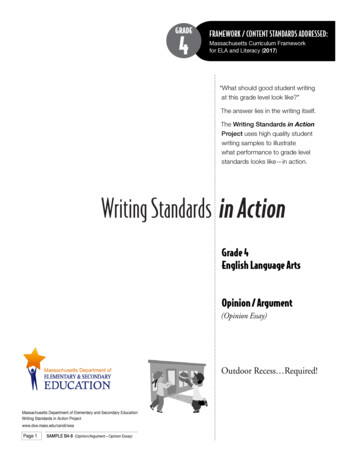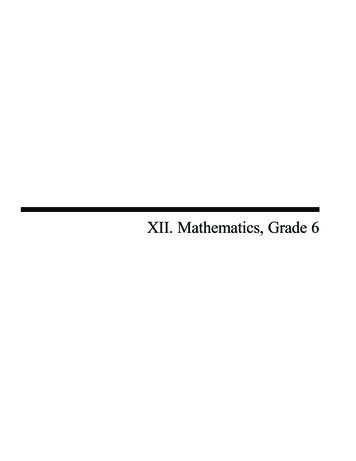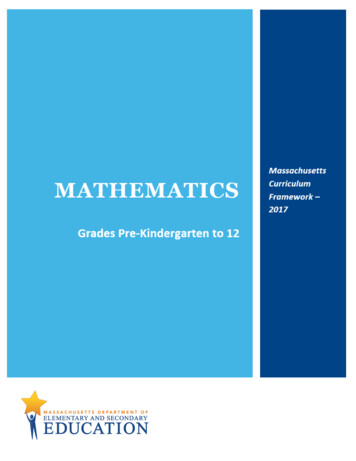
Transcription
MATHEMATICSGrades Pre-Kindergarten to 12iMassachusettsCurriculumFramework –2017
This document was prepared by the Massachusetts Department of Elementary and Secondary EducationBoard of Elementary and Secondary Education MembersMr. Paul Sagan, Chair, CambridgeMr. James Morton, Vice Chair, BostonMs. Katherine Craven, BrooklineDr. Edward Doherty, Hyde ParkDr. Roland Fryer, CambridgeMs. Margaret McKenna, BostonMr. Michael Moriarty, HolyokeDr. Pendred Noyce, BostonMr. James Peyser, Secretary of Education, MiltonMs. Mary Ann Stewart, LexingtonMr. Nathan Moore, Chair, Student Advisory Council,ScituateMitchell D. Chester, Ed.D., Commissioner and Secretary to the BoardThe Massachusetts Department of Elementary and Secondary Education, an affirmative action employer, iscommitted to ensuring that all of its programs and facilities are accessible to all members of the public. We donot discriminate on the basis of age, color, disability, national origin, race, religion, sex, or sexual orientation.Inquiries regarding the Department’s compliance with Title IX and other civil rights laws may be directed tothe Human Resources Director, 75 Pleasant St., Malden, MA, 02148, 781-338-6105. 2017 Massachusetts Department of Elementary and Secondary Education.Permission is hereby granted to copy any or all parts of this document for non-commercial educationalpurposes. Please credit the “Massachusetts Department of Elementary and Secondary Education.”Massachusetts Department of Elementary and Secondary Education75 Pleasant Street, Malden, MA 02148-4906Phone 781-338-3000 TTY: N.E.T. Relay 800-439-2370www.doe.mass.edu
Massachusetts Department ofElementary and Secondary Education75 Pleasant Street, Malden, Massachusetts 02148-4906Dear Colleagues,I am pleased to present to you the Massachusetts Curriculum Framework for Mathematics adopted by the Board ofElementary and Secondary Education in March 2017. This Framework builds upon the foundation of the 2010Massachusetts Curriculum Framework for Mathematics as well as versions of the Massachusetts Mathematics Frameworkpublished since 1995.The current Framework incorporates improvements suggested by Massachusetts educators after six years of experience inimplementing the 2010 standards in their classrooms. These revised pre-kindergarten to grade 12 standards are based onresearch and effective practice, and will enable teachers and administrators to strengthen curriculum, instruction, andassessment.The 2017 standards draw from the best of prior Massachusetts standards, and represent the input of hundreds of theCommonwealth’s K–12 and higher education faculty. The 2017 standards present the Commonwealth’s commitment toproviding all students with a world-class education.This revision of the Framework retains the strengths of previous frameworks and includes these improved features: Increased coherence across the grades and improved clarity of mathematical terms and language to describeexpectations for students.Clear expectations for student mastery of basic addition, subtraction, multiplication, and division facts.An enhanced high school section that includes: 1) clearer model course standards; and 2) guidance on makingdecisions for course sequences and the model Algebra I course, along with options for various course-takingpathways.Guidance for moving students into an Algebra I course by grade 8 and through Calculus in high school; andMore detailed descriptions about rigor and aspirations for students with a stronger emphasis on how the contentstandards, the standards for mathematical practice, and the guiding principles prepare students for college,careers, and civic participation.In the course of revising these standards, the Department received many valuable comments and suggestions. I want tothank everyone who contributed their suggestions and ideas to make these revised standards useful for educators,students, families, and the community. In particular, I am grateful to the members of the Mathematics Standards ReviewPanel and our Content Advisors for giving their time generously to the project to improve the learning standards forMassachusetts students. I am proud of the work that has been accomplished.We will continue to collaborate with educators to implement the 2017 Massachusetts Curriculum Framework forMathematics.Thank you again for your ongoing support and for your commitment to achieving the goal of improved studentachievement for all our students.Sincerely,Mitchell D. Chester, Ed. D.Commissioner of Elementary and Secondary Education
Table of ContentsAcknowledgments .5Introduction .8Guiding Principles for Mathematics Programs in Massachusetts. 14The Standards for Mathematical Practice . 16Standards for Mathematical Content Pre-Kindergarten–Grade 8 . 19Organization of the Pre-Kindergarten to Grade 8 Content Standards . 20Pre-Kindergarten . 22Introduction . 22Pre-Kindergarten Overview . 23Pre-Kindergarten Content Standards . 24Kindergarten . 25Introduction . 25Kindergarten Overview . 26Kindergarten Content Standards . 27Grade 1 . 29Introduction . 29Grade 1 Overview . 30Grade 1 Content Standards . 31Grade 2 . 33Introduction . 33Grade 2 Overview . 34Grade 2 Content Standards . 35Grade 3 . 37Introduction . 37Grade 3 Overview . 38Grade 3 Content Standards . 39Grade 4 . 42Introduction . 42Grade 4 Overview . 43Grade 4 Content Standards . 44Grade 5. 48Massachusetts Curriculum Framework for Mathematics1
Introduction . 48Grade 5 Overview . 49Grade 5 Content Standards . 50Grade 6 . 54Introduction . 54Grade 6 Overview . 56Grade 6 Content Standards . 57Grade 7 . 61Introduction . 61Grade 7 Overview . 62Grade 7 Content Standards . 63Grade 8 . 67Introduction . 67Grade 8 Overview . 68Grade 8 Content Standards . 69The High School Standards for Mathematical Content . 72Introduction . 73High School Content Standards by Conceptual Categories . 76Conceptual Category: Number and Quantity [N] . 77Introduction . 77Conceptual Category: Number and Quantity Overview [N] . 78Conceptual Category: Number and Quantity Content Standards [N] . 79Conceptual Category: Algebra [A] . 81Introduction . 81Conceptual Category: Algebra Overview [A] . 83Conceptual Category: Algebra Content Standards [A] . 84Conceptual Category: Functions [F] . 87Introduction . 87Conceptual Category: Functions Overview [F] . 88Conceptual Category: Functions Content Standards [F]. 89Conceptual Category: Modeling [ ] . 92Introduction . 92Conceptual Category: Geometry [G] . 94Massachusetts Curriculum Framework for Mathematics2
Introduction . 94Conceptual Category: Geometry Overview [G] . 96Conceptual Category: Geometry Content Standards [G] . 97Conceptual Category: Statistics and Probability [S] . 100Introduction . 100Conceptual Category: Statistics and Probability Overview [S] . 101Conceptual Category: Statistics and Probability Content Standards [S]. 102The Standards for Mathematical Content High School:Model Pathways and Model Courses. 105Introduction . 106Model Traditional Pathway: Model Algebra I [AI] . 108Introduction . 108Model Traditional Pathway: Model Algebra I Overview [AI] . 109Model Traditional Pathway: Model Algebra I Content Standards [AI] . 110Model Traditional Pathway: Model Geometry [GEO] . 115Introduction . 115Model Traditional Pathway: Model Geometry Overview [GEO] . 117Model Traditional Pathway: Model Geometry Content Standards [GEO] . 118Model Traditional Pathway: Model Algebra II [AII] . 122Introduction . 122Model Traditional Pathway: Model Algebra II Overview [AII] . 123Model Traditional Pathway: Model Algebra II Content Standards [AII] . 125Model Integrated Pathway: Model Mathematics I [MI] . 129Introduction . 129Model Integrated Pathway: Model Mathematics I Overview [MI] . 131Model Integrated Pathway: Model Mathematics I Content Standards [MI]. 133Model Integrated Pathway: Model Mathematics II [MII] . 137Introduction . 137Model Integrated Pathway: Model Mathematics II Overview [MII] . 138Model Integrated Pathway: Model Mathematics II Content Standards [MII] . 140Model Integrated Pathway: Model Mathematics III [MIII] . 146Introduction . 146Model Integrated Pathway: Model Mathematics III Overview [MIII] . 147Massachusetts Curriculum Framework for Mathematics3
Model Integrated Pathway: Model Mathematics III Content Standards [MIII] . 149Model Advanced Course: Model Precalculus [PC] . 154Introduction . 154Model Advanced Course: Model Precalculus Overview [PC] . 155Model Advanced Course: Model Precalculus Content Standards [PC]. 156Model Advanced Course: Model Advanced Quantitative Reasoning [AQR] . 160Introduction . 160Model Advanced Course: Model Advanced Quantitative Reasoning Overview [AQR] . 161Model Advanced Course: Model Advanced Quantitative Reasoning Content Standards [AQR] . 162Making Decisions about High School Course Sequences andAlgebra I in Grade 8 . 165Course Sequences and the Model Algebra I Course . 165Appendix I: Application of Standards for English Learners and Students with Disabilities . 168English Learners . 168Students with Disabilities. 169Appendix II: Standards for Mathematical Practice Grade-Span Descriptions: Pre-K–5, 6–8, 9–12 . 171Standards for Mathematical Practice Grades Pre-K–5 . 171Standards for Mathematical Practice Grades 6–8 . 174Standards for Mathematical Practice Grades 9–12 . 177Appendix III: High School Conceptual Category Tables . 180Number and Quantity [N] . 181Algebra [A] . 183Functions [F] . 185Statistics and Probability [S] . 187Geometry [G] . 189Glossary: Mathematical Terms, Tables, and Illustrations . 191Tables and Illustrations of Key Mathematical Properties, Rules, and Number Sets . 203Bibliography and Resources . 207Massachusetts Curriculum Framework for Mathematics4
AcknowledgmentsMassachusetts Curriculum Frameworks for English Language Arts and Literacyand Mathematics Review Panel, 2016-2017Rachel Barlage, Lead English Teacher, Chelsea HighSchool, Chelsea Public SchoolsJennifer Berg, Assistant Professor of Mathematics,Fitchburg State UniversityTara Brandt, Mathematics Supervisor, K–12,Westfield Public SchoolsJennifer Camara-Pomfret, English Teacher, SeekonkHigh School, Seekonk Public SchoolsTricia Clifford, Principal, Mary Lee Burbank School,Belmont Public SchoolsLinda Crockett, Literacy Coach, Grades 6–8, WestfieldSouth Middle School, Westfield Public SchoolsLinda Dart-Kathios, Mathematics DepartmentChairperson, Middlesex Community CollegeLinda Davenport, Director of K–12 Mathematics,Boston Public SchoolsBeth Delaney, Mathematics Coach, Revere PublicSchoolsLisa Dion, Manager of Curriculum, Data andAssessment, New Bedford Public SchoolsTom Fortmann, Community Representative,LexingtonOneida Fox Roye, Director of English Language Artsand Literacy, K–12, Boston Public SchoolsAndrea Gobbi, Director of Academic Programs,Shawsheen Valley Technical High SchoolDonna Goldstein, Literacy Coach, Coelho MiddleSchool, Attleboro Public SchoolsAndrea Griswold, Grade 8 English Teacher, MohawkTrail Regional Middle and High School, MohawkTrail/Hawlemont Regional School DistrictSusan Hehir, Grade 3 Teacher, Forest AvenueElementary School, Hudson Public SchoolsAnna Hill, Grade 6 English Language Arts Teacher,Charlton Middle School, Charlton Public SchoolsSarah Hopson, K–4 Math Coach, Agawam ElementarySchools, Agawam Public SchoolsNancy Johnson, 7–12 Mathematics Teacher andDepartment Head, Hopedale Jr.-Sr. High School,Hopedale Public Schools (retired); President,Association of Teachers of Mathematics inMassachusettsPatty Juranovits, Supervisor of Mathematics, K–12,Haverhill Public SchoolsMassachusetts Curriculum Framework for MathematicsElizabeth Kadra, Grades 7 & 8 Mathematics Teacher,Miscoe Hill Middle School, Mendon-Upton RegionalSchool DistrictPatricia Kavanaugh, Middle School MathematicsTeacher, Manchester-Essex Middle and High School,Manchester-Essex Regional School DistrictJohn Kucich, Associate Professor of English,Bridgewater State UniversityDavid Langston, Professor ofEnglish/Communications, Massachusetts College ofLiberal ArtsStefanie Lowe, Instructional Specialist, SullivanMiddle School, Lowell Public SchoolsLinda McKenna, Mathematics Curriculum Facilitator,Leominster Public SchoolsEileen McQuaid, 6–12 Coordinator of EnglishLanguage Arts and Social Studies, Brockton PublicSchoolsMatthew Müller, Assistant Professor of English,Berkshire Community CollegeRaigen O'Donohue, Grade 5 Teacher, ColumbusElementary School, Medford Public SchoolsEileen Perez, Assistant Professor of Mathematics,Worcester State UniversityLaura Raposa, Grade 5 Teacher, Russell StreetElementary School, Littleton Public SchoolsDanika Ripley, Literacy Coach, Dolbeare ElementarySchool, Wakefield Public SchoolsHeather Ronan, Coordinator of Math and Science,PK–5, Brockton Public SchoolsFran Roy, Chief Academic Officer/AssistantSuperintendent, Fall River Public SchoolsMelissa Ryan, Principal, Bourne Middle School,Bourne Public SchoolsKaryn Saxon, K–5 Curriculum Director, EnglishLanguage Arts and Social Studies, Wayland PublicSchoolsJeffrey Strasnick, Principal, Wildwood Early ChildhoodCenter and Woburn Street Elementary School,Wilmington Public SchoolsKathleen Tobiasson, Grades 6 & 7 English Teacher,Quinn Middle School, Hudson Public SchoolsBrian Travers, Associate Professor of Mathematics,Salem State University5
Nancy Verdolino, K–6 Reading Specialist and K–6English Language Arts Curriculum Chairperson,Hopedale Public Schools; President, MassachusettsReading AssociationMeghan Walsh, Grade 3 Teacher, John A. CrisafulliElementary School, Westford Public SchoolsRob Whitman, Professor of English, Bunker HillCommunity CollegeKerry Winer, Literacy Coach, Oak Hill Middle School,Newton Public SchoolsJoanne Zaharis, Math Lead Teacher/Coach,Sokolowski School, Chelsea Public SchoolsContent AdvisorsEnglish Language Arts and LiteracyBill Amorosi, ELA/Literacy ConsultantMary Ann Cappiello, Lesley UniversityErika Thulin Dawes, Lesley UniversityLorretta Holloway, Framingham State UniversityBrad Morgan, Essex Technical High SchoolDeborah Reck, ELA/Literacy ConsultantJane Rosenzweig, Harvard UniversityMathematicsRichard Bisk, Worcester State UniversityAndrew Chen, EduTron CorporationAl Cuoco, Center for Mathematics Education, EDCSunny Kang, Bunker Hill Community CollegeMaura Murray, Salem State UniversityKimberly Steadman, Brooke Charter SchoolsExternal PartnerJill Norton, Abt AssociatesMassachusetts Executive Office ofEducationTom Moreau, Assistant Secretary of EducationMassachusetts Department of HigherEducationSusan Lane, Senior Advisor to the CommissionerMassachusetts Department ofElementary and Secondary EducationJeffrey Wulfson, Deputy CommissionerHeather Peske, Senior Associate CommissionerMassachusetts Curriculum Framework for MathematicsCenter for Instructional SupportAlexia CribbsLisa KeenanRonald NobleOffice of Literacy and HumanitiesRachel Bradshaw, Lead Writer,ELA/LiteracyDavid BuchananMary Ellen CaesarSusan KazeroidHelene LevineTracey MartineauLauren McBrideSusan Wheltle, ConsultantOffice of Science, Technology/Engineering, andMathematicsAnne Marie CondikeAnne DeMallieJacob FosterMelinda GriffinMeto RahaIan StithLeah TuckmanCornelia Varoudakis, Lead Writer, MathematicsBarbara Libby, ConsultantOffice of Educator DevelopmentMatthew HollowayOffice of English Language Acquisition andAcademic AchievementFernanda KraySara NiñoOffice of Special Education Planning andPolicyTeri Williams ValentineLauren VivianiOffice of Planning, Research, and DeliveryMatthew DeningerCommissioner’s OfficeJass Stewart6
Office of Student Assessment ServicesMary Lou BeasleyCatherine BowlerAmy CarithersHaley FreemanSimone JohnsonJennifer MalonsonElizabeth NiedzwieckiJennifer Butler O’TooleMichol StapelJames VerdolinoDaniel WienerMassachusetts Curriculum Framework for Mathematics7
IntroductionThe Origin of these Standards: 1993–2010The Massachusetts Education Reform Act of 1993 directed the Commissioner and the Department ofElementary and Secondary Education1 to create academic standards in a variety of subject areas. Massachusettsadopted its first set of Mathematics standards in 1995 and revised them in 2000. In 2007, the MassachusettsDepartment of Elementary and Secondary Education (ESE) convened a team of educators to revise its 2000Mathematics Curriculum Framework. In 2009 the Council of Chief State School Officers (CCSSO) and the NationalGovernors Association (NGA) began a multi-state standards development project called the Common Core StateStandards initiative, whereupon the two efforts merged. The pre-kindergarte
Panel and our Content Advisors for giving their time generously to the project to improve the learning standards for Massachusetts students. I am proud of the work that has been accomplished. We will continue to collaborate with educators to implement the 2017 Massachusetts Curriculum Framework for Mathematics.
